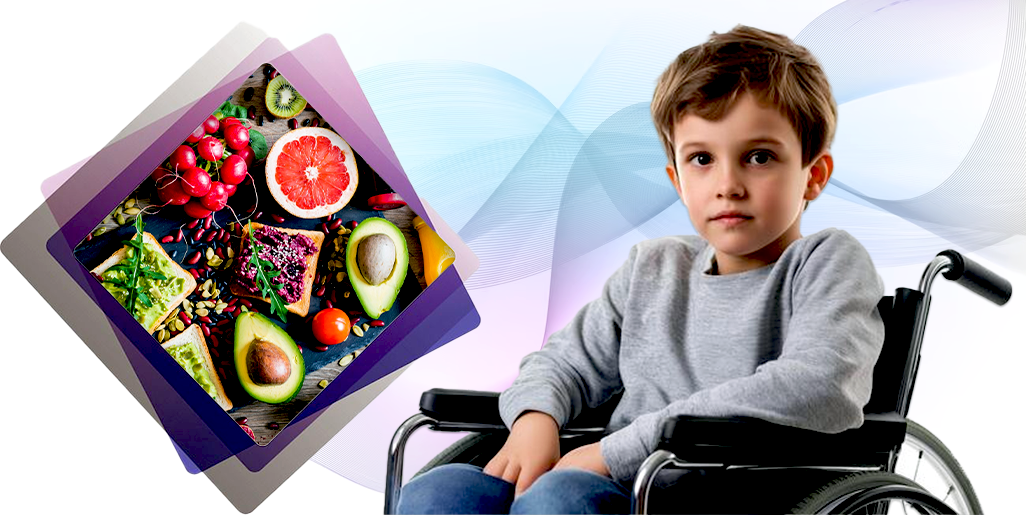Make An Appointment
For emergency Case
Booking A visit
Natural Diet for Cerebral Palsy Patients
Cerebral Palsy refers to a group of disorders caused by abnormal development or damage to motor control areas in the brain, which affects the movement, muscle tone, and posture of an individual. Damage often takes place before birth, during delivery, or immediately after, inhibiting normal development and giving a lifetime challenge to coordination and muscle function. CP is quite a variable disorder in presentation and level of severity and affects people differently. Their symptoms might include anything ranging from muscle stiffness, coordination, and balance problems to involuntary movements, tremors, speech, or swallowing disorders. These usually begin early in life and worsen without proper management.
The cause of Cerebral Palsy is not known with certainty, although most cases are often related to factors such as a lack of oxygen to the brain during birth, premature birth, infections during pregnancy, and genetic factors. Each case of CP is unique in its manifestations, ranging from mild to severe, depending on the areas and extent of brain damage. As of now, no cure has been found for CP, but advancements in medical science, especially in regenerative medicine, promise patients a better quality of life.
Stem cell therapy brings hope for curing Cerebral Palsy (CP) as it helps in the repair and regeneration of damaged neural tissues, thereby potentially improving motor functions and symptoms. To begin with such treatment, one should, first of all, consult an experienced provider like Global Stem Cell Care, which will give the latest insight and guidance for the treatment of CP by using stem cells.
Healthy Diet Recommendation for Cerebral Palsy Patients
Nutrition is one of the key factors, and it is especially critical for people with Cerebral Palsy because they need a high amount of energy and strength to create a strong muscular system and in general good health. Most of the children with CP have set exclusive nutrition issues, based on tense muscles, gastrointestinal disorders, and the energy demand on movement. Here are some foods to include and avoid for people with CP.
Foods to Include
- High Caloric Foods
Most patients with CP require much more energy due to the increased efforts of their muscles in moving themselves around. The inclusion of healthy resources such as avocados, nuts, seeds, olive oil, and peanut butter will ensure that one’s weight remains steady at an ideal level for a healthy energy state.
- Lean Proteins
Muscle strength is essential in controlling symptoms and achieving maximum mobility. Other sources of lean proteins include chicken, turkey, fish, eggs, and beans for healthy muscles. Very soft-cooked proteins, like scrambled eggs or moist fish, may also be acceptable for patients with disabilities in chewing or swallowing.
- Omega-3 Rich Foods
Omega-3 fatty acids can contribute to reducing inflammation and healthy brains. Among some of the best foods that contain omega-3, there are salmon, flaxseeds, chia seeds, and walnuts. One could say that neural support may be an added benefit from them.
- Fiber-Rich Foods
Constipation is also another common issue for most patients as they do not move much. High-fiber food products include whole grains vegetables and fruits because they help in the digestion process and work well in gut health maintenance. Pureed vegetables or soft fruits, such as berries and bananas, are good choices for easier consumption.
- Foods with Rich Antioxidants
Antioxidants protect against cellular damage and general well-being. Dark-colored fruits and vegetables, including berries, spinach, and sweet potatoes, are rich in antioxidants and can be used to incorporate into meals to raise immunity.
- Smoothies and Pureed Foods
It is much easier to consume nutrient-rich foods for patients suffering from dysphagia due to the intake of smoothies and pureed meals. Extra vitamins and minerals may be delivered through smoothies by using Greek yogurt, fruits, and vegetables.
Foods to Avoid
Processed and Sugary Foods
Processed snacks, sugary drinks, and refined carbohydrates are nutrient-poor and will give you an energy crash. These foods can also cause weight gain without providing the necessities.
High-Sodium Foods
Processed meats and soups are high in sodium and can cause dehydration. Drinking a lot of salt also causes stiff muscles, so a limit must be put on salt consumption for better muscle function and hydration.
Hard-to-Swallow Foods
Crunchy and dry foodstuffs, such as crackers and raw vegetables, would be difficult to swallow and therefore should be avoided for CP patients, especially in those with dysphagia.
Fried Foods
Fried foods are difficult to digest and tend to cause gastrointestinal symptoms. The best cooking methods that should be in place are baking or steaming for easier digestion.
Alcohol and Caffeine
Alcohol and caffeine may hinder the control of your muscles, hydration, and even general health. Such substances should be avoided because they worsen the symptoms and decrease energy levels.
